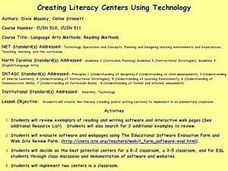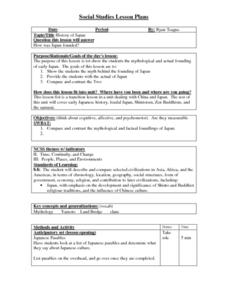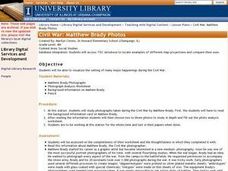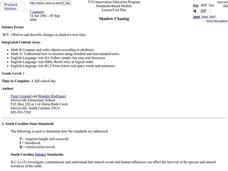Curated OER
Cloudy With A Chance of Meatballs
Third graders use a variety of information resources to identify local environmental issues and examine the ways that people have tried to solve these problems. They read "Cloudy With A Chance of Meatballs" and create a list of three...
Curated OER
Tribal Traits
Fourth graders will analyze the similarities and differences between early Texas Indian tribes, compare and contrast two tribes, select to which tribe they would rather belong, and determine their location today.
Curated OER
Religion and Deaf Education: The Contract Between Clerc and Gallaudet
High schoolers examine the issues surrounding the prevailing religious and cultural beliefs in the early 19th century United States and how they influenced the education of deaf people. They apply this information to modern day contexts.
Curated OER
Ghost Canoe
Fourth graders are read the book "Ghost Canoe" by their teacher. Using a map, they locate the physical characteristics of Washington State and describe how people adapted to their environment before statehood. They discover how people...
Curated OER
Creating Literacy Centers Using Technology
Students create two literacy (reading and/or writing) centers to implement in an elementary classroom. Students review examples of educational software and determine the best potential centers to use in elementary classroom. Two centers...
Curated OER
History of Japan
Students research the mythological and factual founding of early Japan. They compare and contrast the two accounts. As an assessment activity, they fill out a chart that compares and contrasts the facts and myths surrounding Japanese...
Curated OER
American Folktales
Fourth graders read and interpret an American Folktale. Students create their own folktale about Indiana. Students use digital cameras and clipart from the computer to create a photo story. Students present their animated folktales to...
Curated OER
Civil War: Matthew Brady Photos
Fourth graders read background information on Matthew Brady and examine photographs of the Civil War taken by him. They fill in worksheets based on their research.
Curated OER
Diplomatic Misunderstandings: Indian Treaties and the Black Hawk War
High schoolers examine and discuss the U.S./Native American treaty process of the early 19th century. They write essays describing the events behind the 1804 and 1816 treaties, and their assessment of U.S. diplomatic interactions with...
Curated OER
A Journey to Language Arts
Young scholars explore events of the Lewis & Clark expedition. Students observe a PowerPoint presentation. They demonstrate journal writing using first person point of view. Young scholars describe life in North America during the...
Curated OER
Beat the Greeks
Students conduct research of the history of atomic theory. Information is presented from Democritus and Aristotle to the early Renaissance using the Internet and video.The integration of technology allows for a vast amount of research...
Curated OER
What's Important?
Students, through teacher modeling and guided practice, explore four steps/rules of summarizing. In groups, they read a short passage and then, by applying the summarization rules and skills, write an effective summary of it.
Curated OER
5 Senses Poem
Students discuss what characteristics they learned about each season through the story read aloud. They identify each season and come up with objects for each season, such as clothing, activities one can do, and describe the scenery....
Curated OER
P a g e - b y - P a g e
Students discuss the writing process and take notes on the five steps and how they can be used in other subjects. They examine a newspaper article and after reading it they identify the five W's and H. They brainstorm to come up with...
Curated OER
Shadow Chasing
First graders observe and measure their shadows. They go outside at three hour increments during the course of a day. Each time students measure and record the length of their shadows. Students read books about shadows and discuss why...
Curated OER
Pocumtucks In Deerfield
Students read a story about the Pocumtucks' religious beliefs. Using the text, they discover their concept of land ownership and how they migrated within their territory in different seasons. They use primary and secondary sources to...
Curated OER
Compatible numbers to 20
Learners practice theories dealing with equals sign used as a balance, inequality symbols and practice utilizing a box or some other geometric shape to represent an unknown number. They assess numeracy problems embedded in language-rick...
Curated OER
Comprehension: Create a Summary from an Expository Text
Children can learn to analyze expository or informational texts at nearly any age. This scaffolded and scripted resource provides teachers with the support needed to facilitate a thoughtful lesson on summarizing informational text by...
Curated OER
Skeleton
Students study the skeleton. In this human body lesson, students draw and label bones in the body by tracing each other and creating a skeleton out of body parts and brass fastners.
Curated OER
Introducing George Washington
Students write down facts about George Washington. In this lesson on our first president, students listen to a story about George Washington and retell four facts about him.
Curated OER
Wild Things - Texture And Pattern
Students implement textures and patterns in creating an imaginary Wild Thing, using the book and illustrations in Where the Wild Things Are by Maurice Sendak serve as Inspiration.
Curated OER
Everyone Can Benefit from Professional Development
These resources will point you in the direction of valuable professional development opportunities.
Science 4 Inquiry
Layers and Laws: The Law of Superposition and Index Fossils
What can layers of rock teach us about the climate? Young scientists solve a mystery about who stole a cookie by applying the law of superposition. Then, they apply the same concept to solve a more difficult mystery, trying to determine...
Curated OER
Venn Diagram-Paleolithic and Neolithic
Review the paleolithic and neolithic time periods using this creative instructional activity. After a unit on Mesopotamia and the Stone Age, learners fill out a Venn diagram comparing the paleolithic and neolithic period, and write a...

























